ISIS简史:全球最可怕的恐怖组织是如何长成的
ISIS, a history: how the world’s worst terror group came to be
作者:Zack Beauchamp @ 2015-11-19
译者:Veidt(@Veidt)
校对:小册子(@昵称被抢的小册子)
来源:VOX,http://www.vox.com/2015/11/19/9760284/isis-history
To understand the Islamic State of Iraq and Syria — why it exists, what it wants, and why it commits terrible violence of which the Paris attacks are only the latest — you need to understand the tangled story of how it came to be.
如果想了解伊拉克与叙利亚伊斯兰国(ISIS)——为什么它会存在,它想要什么,还有为什么它会犯下诸如最近的巴黎恐怖袭击之类可怕暴行——你需要了解在它成长历程中所发生的曲折故事。
The group began, in a very different form, in 1999. In the 16 years since, it has been shaped by — and has at moments helped to shape — the conflicts, physical and ideological, of the Middle East.
该组织始建于1999年,但它在当时的形式与现在大不相同。在之后的16年中,它被中东的武力和意识形态冲突所塑造,也时而塑造着这些冲突。
Here, then, is a concise history of the rise of ISIS from its earliest origins to the present day. It is the story of one of the richest and most powerful terrorist organizations ever to exist — but it’s also a story that reveals the ways in which ISIS has proven much weaker than you might think.
在这里,我将呈现ISIS从最初的起源直到今天的一部简明历史。这是关于史上最富有也最强悍的恐怖组织之一的故事——但这个故事也同样揭示了,ISIS的一些所作所为,证明了它实际上比人们所想象的要脆弱得多。
1989–1999: The Soviet war in Afghanistan and the beginning of ISIS
1989-1999:苏联的阿富汗战争和ISIS的发端
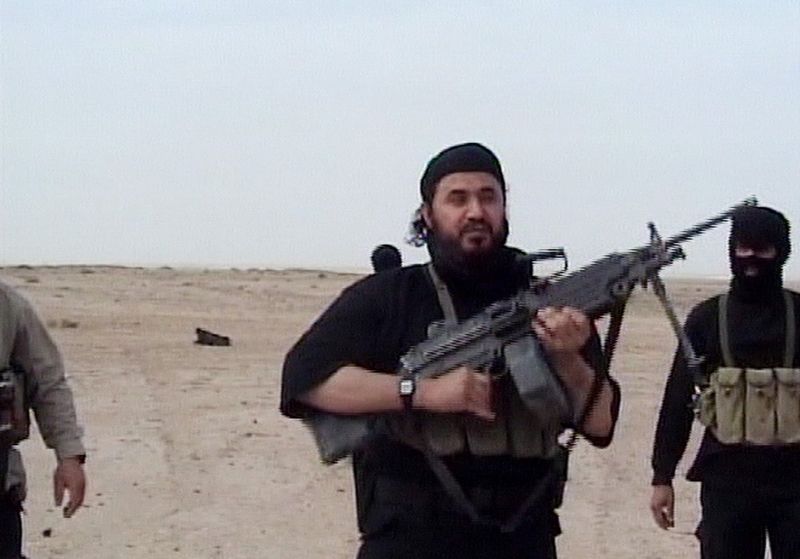 【Abu Musab al-Zarqawi(即扎卡维)在伊拉克。】
【Abu Musab al-Zarqawi(即扎卡维)在伊拉克。】
You cannot understand ISIS without understanding al-Qaeda and the history they share, as well as the differences, there at the beginning, that would ultimately divide them. And al-Qaeda’s origin story begins with the 1979 Soviet invasion of Afghanistan.
如果不了解基地组织以及它和ISIS的共同历史,还有它们之间一开始就存在的差异(正是这些差异让它们最终分道扬镳),你就无法真正地了解ISIS。基地组织的故事最初始于苏联在1979年入侵阿富汗。
Soviet aggression shocked the Muslim world, galvanizing roughly 20,000 foreign fighters to help Afghans resist Soviet forces. That’s where Osama bin Laden met a number of other young radicals, who together formed the core of the al-Qaeda network.
苏联的侵略震惊了整个穆斯林世界,并激起了大约2万名外国战士帮助阿富汗人抵抗苏联军队。正是在那里,奥萨马·本·拉登遇上了一群年轻的极端分子,他们共同组建了基地组织网络的核心团队。
The Soviets withdrew in 1988, but they left a puppet regime in place, and the war continued. The next year, a Jordanian man named Ahmad Fadhil Nazzal al-Khalaylah joined them.
苏联人在1988年撤离了阿富汗,但是他们留下了一个傀儡政权,而战争也还在继续。第二年,一个名叫Fadhil Nazzal al-Khalaylah的约旦人加入进来。
Al-Khalaylah would, years later, achieve global infamy under his nom de guerre, Abu Musab al-Zarqawi. He would found the group that became what we today call ISIS.
几年后,al-Khalaylah以他的别名Abu Musab al-Zarqawi(即扎卡维)在全球臭名昭著。他创建了在今天被我们称之为ISIS的恐怖组织。
When Zarqawi first traveled to Afghanistan, in 1989, he wasn’t all that religious: He was, as Mary Anne Weaver writes in a definitive Atlantic profile, something of a petty thug. But once there, he met a man named Sheikh Abu Muhammad al-Maqdisi, a leading proponent of violent, fundamentalist Islam. Maqdisi converted Zarqawi to his cause.
当扎卡维在1989年第一次来到阿富汗时,他并不是那么满怀宗教热情:正如Mary Anne Weaver在《大西洋月刊》发布的一份权威传略中所写道的,他当时只不过是个小流氓。但一到阿富汗,他就遇上了一个名叫Sheikh Abu Muhammad al-Maqdisi的暴力伊斯兰原教旨主义的主要倡导者。Maqdisi按照自己的理念改造了扎卡维。
Zarqawi would not meet bin Laden for years, and the two men built up allies and followers independently from each other — a dynamic that made Zarqawi’s network even more extreme than bin Laden’s.
在之后的数年中,扎卡维都还没有遇上本·拉登,两人各自独立地建立起了自己的盟友和追随者网络——在此过程中,扎卡维的网络甚至比本·拉登的更极端。
“Whereas bin Laden and his cadre grew up in at least the upper middle class and had a university education, Zarqawi and those closest to him came from poorer, less educated backgrounds,” Aaron Zelin, a fellow at the Washington Institute for Near East Policy, writes. “Zarqawi’s criminal past and extreme views on takfir (accusing another Muslim of heresy and thereby justifying his killing) created major friction and distrust with bin Laden when the two first met in Afghanistan in 1999.”
“本·拉登和他的核心骨干都至少是在上层中产阶级长大的,而且也都受过大学教育,而扎卡维和他的亲信们则来自较贫穷,教育程度也较低的阶层,”华盛顿近东政策研究所的学者Aaron Zelin如此写道。“1999年扎卡维在阿富汗首次见到本·拉登时,他的犯罪前科和他关于塔克菲(通过将另一名穆斯林控诉为异教徒,而为将他杀死的行为提供穆斯林教法上的合法性)的极端观点在两人之间造成了很大的摩擦和不信任感。”
2003–2009: The rise and fall of al-Qaeda in Iraq
2003-2009:伊拉克基地组织的兴衰
Zarqawi returned from Afghanistan, and in 1999 in Jordan formed his own group, Jamaat al-Tawhid wal-Jihad (JTWJ), or the Organization of Monotheism and Jihad. For the first few years, Zarqawi’s group was a bit player among jihadists, overshadowed by al-Qaeda. But this was the group, then little known, that would later become ISIS.
从阿富汗回来之后,扎卡维1999年在约旦建立了自己的组织,名为Jamaat al-Tawhid wal-Jihad(JTWJ),或叫“一神论与圣战组织”。在最初的几年中,扎卡维的组织和基地组织相比相形见绌,在众多伊斯兰圣战组织中只是个小玩家。但这个在当时还默默无闻的组织就是日后ISIS的雏形。
In 2003, the US led its invasion of Iraq and changed, in the world of jihadists, everything.
2003年,美国领导了对伊拉克的入侵行动,这完全改变了伊斯兰圣战者的世界。
The American-led war, by destroying the Iraqi state, left much of the country in chaos. Foreign fighters and extremists began moving into Iraq, assisted by Bashar al-Assad’s regime in Syria, which sought to bog down the US. Zarqawi and his group were among them.
由美国所主导的伊拉克战争摧毁了伊拉克的国家机器,让这个国家的大部分地区陷入混乱的深渊。在力图将美国拖入泥潭的叙利亚巴沙尔·阿萨德政权的帮助下,来自外国的战士和极端分子开始涌入伊拉克,而扎卡维和他的极端组织也在其中。
The Sunni extremists who arrived found a friendly audience among former Iraqi soldiers and officers: The US had disbanded Saddam Hussein’s overwhelmingly Sunni army, which was disbanded in 2003, creating a group of men who were unemployed, battle-trained, and scared of life in an Iraq dominated by its Shia majority.
这些来到伊拉克的逊尼派极端分子在伊拉克前政权的士兵和军官中找到了一批知音:美国在2003年解散了效忠于萨达姆·侯赛因,以逊尼派占压倒性多数的军队,从而创造了一个受过实战训练的失业军人群体,他们对于生活在一个由占人口多数的什叶派统治的国家感到十分恐惧。
Zarqawi’s group, as it fought in Iraq, grew to prominence, attracting al-Qaeda’s attention. In 2004, Zarqawi pledged loyalty to al-Qaeda, for which he would receive access to its funds and fighters. His group was renamed al-Qaeda in Iraq (AQI), and it became the country’s leading Sunni insurgent group.
扎卡维的组织在伊拉克的战斗中不断成长壮大,最终吸引到了基地组织的注意。2004年,扎卡维宣誓向基地组织效忠,以换取基地组织所提供的资金和战士。他的组织被更名为伊拉克基地组织(AQI),而该组织也成为了伊拉克境内最主要的逊尼派武装力量。
AQI didn’t just fight the Americans, it also attacked fellow Iraqis. It bombed Shia mosques and slaughtered Shia civilians, hoping to provoke mass Shia reprisals against Sunni civilians and thus force the Sunnis to rally behind AQI. It worked, and it’s a tactic ISIS still uses today. It also helped spark a civil war in Iraq between Sunnis and Shia.
伊拉克基地组织不仅仅与美国人作战,它同样也攻击伊拉克同胞。它炸毁什叶派的清真寺并且屠杀什叶派平民,力图煽动什叶派对逊尼派平民的大规模报复,从而迫使逊尼派聚集在自己的羽翼之下。这一策略取得了成功,并且直到今天ISIS还在使用这样的策略。而这也引发了一场伊拉克逊尼派和什叶派之间的内战。
But these methods were too vicious even for al-Qaeda, which warned Zarqawi to cool it. He ignored the warnings, and AQI came to hold a swath of territory in Sunni parts of Iraq, roughly along the lines of what ISIS controls there today. Yet between 2006 and 2009, it all came crashing down:
但即使对于基地组织而言,这样的方法也显得太恶毒了,于是基地组织警告扎卡维,让他把事态冷却下来。但扎卡维无视这一警告,而伊拉克基地组织则进一步占领了伊拉克逊尼派聚居的一片土地,与ISIS今天在这里所控制区域的边界相仿。然而在2006年和2009年之间,这一切几乎都土崩瓦解了:
【由AQI和其他逊尼派叛乱团体控制的领土。】
Starting in 2006, AQI’s extremism began to backfire. Sunni tribal leaders, who had always hated living under AQI’s harsh and often violent rule, became convinced that the Shias were starting to win Iraq’s sectarian civil war. To avoid being on the losing end of a bloody war, they up took arms against AQI in a movement called the Awakening.
从2006年开始,伊拉克基地组织所贯彻的极端主义开始遭遇挫折。那些对于生活在伊拉克基地组织严酷而暴力的统治之下一直心怀怨恨的逊尼派部落长老们开始相信,什叶派将会赢得这场伊拉克的宗派内战。为了避免在一场血腥战争中成为失败的一方,他们发起了一场称为“觉醒”的运动,武装反抗伊拉克基地组织。
Zarqawi was killed in 2006 by a US airstrike, and the US increased its troop presence in Iraq that year and the next. But it was, more than anything else, the Awakening that defeated al-Qaeda in Iraq.
扎卡维在2006年死于美军空袭,而美国在当年和次年都往伊拉克增派驻军。但是在打败伊拉克基地组织的过程中,“觉醒”运动所发挥的作用还是超过了任何其它因素。
By 2009, almost all of AQI’s fighters were dead or in prison, and the group was a shadow of itself. But it had learned a valuable lesson: Dissent from Sunnis under its rule could be disastrous. That’s why, years later, ISIS has slaughtered members of Sunni tribes, such as Iraq’s Abu Nimr, en masse. It sees brutality as the best way to prevent a replay of the 2006 uprising that led to its downfall.
到2009年,几乎所有伊拉克基地组织的战士都已被歼灭或是被关进了监狱,组织几乎名存实亡。但是它学到了宝贵的一课:受其统治的逊尼派的不满可以带来灾难性的后果。这也是为何在几年之后,ISIS屠杀了一些逊尼派的部族成员,例如对伊拉克Abu Nimr部落的集体屠杀。为防止类似2006年那场导致它衰落的起义重演,它将残酷暴行视为最佳的预防措施。
2010: Iraq begins unraveling, setting the stage for AQI’s comeback
2010年:伊拉克开始解体,并为伊拉克基地组织的回归创造了舞台
ISIS was able to rise from AQI’s ashes in no small part because of Iraq’s catastrophic internal politics.
ISIS之所以能从伊拉克基地组织的废墟之上重新崛起,很大程度上是由于伊拉克灾难性的国内政治。
“Iraq was the essential incubator,” according to Fred Hof, who for part of 2012 served as the Obama administration’s special adviser for the transition in Syria.
“伊拉克是ISIS成长所必需的孵化器”,Fred Hof如此评论道。2012年有段时间,他曾担任奥巴马政府关于叙利亚过渡时期问题的特别顾问。
By 2010, “Iraq finally had relatively good security, a generous state budget, and positive relations among the country’s various ethnic and religious communities,” Zaid al-Ali, author of The Struggle for Iraq’s Future, wrote in Foreign Policy. But it was squandered. Prime Minister Nouri al-Maliki stripped political opponents of power, appointed his cronies to run the army, and killed peaceful protestors.
到2010年,“伊拉克终于拥有了相对较好的安全局势,宽松的国家预算,国内各种族和宗教群体之间的关系也比较积极,”《挣扎中的伊拉克》的作者Zaid al-Ali在《外交政策》杂志上写道。但这些有利形势最终都被浪费掉了。伊拉克总理Nouri al-Maliki(马利基)剥夺了政敌们的权力,安排自己的亲信控制军队,并且杀害了一些和平抗议者。
Most importantly, he reconstructed the Iraqi state on sectarian lines, privileging the Shia majority over the Sunni minority. This exacerbated Iraq’s existing sectarian tensions: Sunni Iraqis falsely believed themselves to be Iraqi’s majority (owing to Saddam-era propaganda) and saw Maliki as depriving them of their rightful control of the state. He only deepened their belief that the Iraqi state was fundamentally illegitimate.
而最重要的是,他按照宗教派别重塑了伊拉克,让占人口多数的什叶派获得了比占人口少数的逊尼派更多的特权。这加剧了伊拉克国内本已存在的宗派紧张局势:伊拉克的逊尼派总是误以为他们才是伊拉克真正的“多数派”(这要归因于萨达姆时期的宣传),因而觉得马利基在剥夺他们对国家应有的控制权。逊尼派认为伊拉克现政府根本不具有合法性,而马利基的做法加深了他们的这一信念。
By this time, al-Qaeda in Iraq had a new leader: Abu Bakr al-Baghdadi, an Iraqi who had a background in serious religious scholarship. Under his leadership, AQI began allying with former officers from Saddam Hussein’s army and recruited disaffected Sunnis. Iraq’s own government, unintentionally, gave them exactly the opening they needed to regain strength.
此时,伊拉克基地组织有了一位新领袖:巴格达迪,他是一个拥有着严肃宗教学术背景的伊拉克人。在他的领导下,伊拉克基地组织开始与一些前萨达姆军队的军官建立同盟,并且招募了一些对伊拉克现政府极度不满的逊尼派穆斯林。伊拉克政府在不经意间为他们的东山再起提供了绝佳机会。
“Raw political sectarianism in Iraq was the main causal factor [in ISIS’s rise],” Hof writes.
“伊拉克国内原始的政治宗派斗争是ISIS再次崛起的主要原因,”Hof如此写道。
August 2011: AQI’s remnants move into Syria — with a little help from Assad
2011年8月:在阿萨德的一点帮助下,伊拉克基地组织的残余力量进入叙利亚
Around this same time, Syria erupted in Arab Spring protests that became a civil war. In March 2011, Syrian demonstrators took to the streets to demand Bashar al-Assad step down. Almost right away, the Syrian regime began slaughtering protestors in an attempt to provoke a civil war.
几乎在同一时间,叙利亚 爆发了“阿拉伯之春”运动,而这最终演变成了一场内战。在2011年3月,叙利亚的抗议者占领了大街小巷,要求巴沙尔·阿萨德下台。叙利亚政权很快开始屠杀抗议者,以图引发内战。
“It was very much a strategic decision that the regime made, to militarize the conflict right away,” Glenn Robinson, an associate professor at the Naval Postgraduate School, told me in a phone conversation. “I think, in their mind and correctly, if this becomes a political battle where populations matter, the regime probably only has support of a third of the country … the opposition has the numbers.”
“迅速地将这场冲突军事化,实际上是阿萨德政权所采取的一项相当有战略意义的决策”,美国海军研究生院的副教授Glenn Robinson在一次电话采访中如此对我说。“我认为,在他们看来,如果这场冲突演变成一场人口因素起重要作用的政治斗争,阿萨德政权可能仅仅能获得全国三分之一人口的支持……反对派则占据着人口的大多数,这个判断是正确的。”【编注:叙利亚1700万人口中,74%为逊尼派,控制政权的阿拉维派(什叶派的一个支派)仅占12%。】
Perhaps the most devious part of this strategy was Assad’s deliberate effort to promote Islamic extremism among the opposition. In amnesties issued between March and October 2011, Assad released a significant number (exact counts are hard to know) of extremists from Syrian prisons. Hof called this an “effort to pollute the opposition with sectarianism”: Assad gambled that if his enemies were Islamic militants, then the West wouldn’t intervene against him.
也许这一策略中最为邪恶的部分在于,阿萨德蓄意地在反对派中散布伊斯兰极端主义。在2011年3月到10月的大赦中,阿萨德从叙利亚监狱中释放了相当数量(很难得知准确数字)的极端分子。Hof称之为“一项试图用宗派主义污染反对派阵营的举措”:阿萨德赌了一把,如果他的敌人是伊斯兰激进武装分子,那么西方各国就不会采取针对他的干预行动。
In August 2011, Baghdadi sent a top deputy, Abu Mohammad al-Joulani, to Syria to set up a new branch of the AQI in the country. Joulani succeeded, establishing Jabhat al-Nusra in January 2012. Joulani’s fighters quickly proved themselves to be some of the most effective fighters on the Syrian battlefield, swelling their ranks with new recruits.
2011年8月,巴格达迪将他的得力副手Abu Mohammad al-Joulani派往叙利亚,以在叙境内建立伊拉克基地组织的新分支。Joulani的行动获得了成功,他在2012年1月建立了一个名为Jabhat al-Nusra(即努斯拉阵线)的组织。Joulani的战士们迅速证明了他们是叙利亚战场上最高效的战斗群体之一,并通过招募大量新成员提升了组织的地位。
At this point, Baghdadi’s original group was still in Iraq alone. It had not become ISIS. But to understand how it did, you have to see the larger forces that opened his way.
巴格达迪的组织此时仍仅限于在伊拉克境内活动,它还没有成为那个令人谈之色变的ISIS。如果想要了解它后来是如何做到这一点的,你需要了解一下为巴格达迪铺平道路的那些更加强大力量。
Early 2012: Syrian jihadists get their “angel investors”
2012年初:叙利亚的圣战者迎来了他们的“天使投资人”
Today, ISIS is the world’s richest terrorist group, its funding coming mostly from various extortion schemes in the territory it controls. But back in 2012, foreign donations played a crucial role in growing the group from the poor organization it was then into the monster it is today.
今天,ISIS是世界上最富有的恐怖组织,它主要依靠在控制区进行各种掠夺来获得资金。但回到2012年,在这个当时还穷困潦倒的组织成长为今天这头恐怖怪兽的过程中,来自国外的捐助扮演了关键角色。
In 2012, money flew into Syria from the Gulf Arab states — places like Kuwait, Saudi Arabia, and Qatar. The key investments in ISIS didn’t come directly from those countries’ governments, but rather from private individuals living there who wanted to see the Assad regime fall — and perhaps to promote extremism itself.
2012年,来自波斯湾阿拉伯国家(例如科威特、沙特阿拉伯和卡塔尔)的资金涌入了叙利亚。ISIS所得到的主要投资并不直接来自这些国家的政府,而是来自生活在这些国家的国民,他们希望看到阿萨德政权倒台——也可能只是为了推行伊斯兰极端主义。
“These rich Arabs are like what ‘angel investors’ are to tech start-ups, except they are interested in starting up groups who want to stir up hatred,” former US Navy Admiral and NATO Supreme Commander James Stavridis told NBC last June. “Groups like al-Nusra and ISIS are better investments for them [than moderates].”
“这些阿拉伯富豪所扮演的角色就像是科技初创企业的‘天使投资人’,唯一的区别在于,他们的目的是创立一些旨在煽动仇恨的极端组织,”前美国海军上将和北约总司令James Stavridis将军在去年6月向NBC表示,“(相对于温和派),像努斯拉阵线和ISIS这样的组织对他们而言是更好的投资。”
Though these donors have since faded in importance, they were invaluable at the time. “The individuals,” Stavridis explained, “act as high rollers early, providing seed money. Once the groups are on their feet, they are perfectly capable of raising funds through other means, like kidnapping, oil smuggling, selling women into slavery, etc.”
虽然这些捐款人的重要性自此逐渐减退,但他们在当时对ISIS是无价之宝。Starvridis将军解释道,“这些富人在早期一掷千金,为极端组织提供了种子基金。而一旦这些组织能够站稳脚跟,他们就完全有能力通过其它的手段获得资金,例如绑架人质,走私石油,将妇女贩卖为奴等等。”
But while the Gulf financiers’ intent may have been to hurt Assad, they actually ended up propping him up by playing into his strategy of promoting extremism.
虽然这些波斯湾“投资人”最初可能是为了打击阿萨德政权,但结果却是通过散布极端主义而成了阿萨德的棋子,最终帮助了阿萨德。
“It was a service of incalculable value to the Assad regime: It enabled him to say — albeit inaccurately — that he was the alternative to terrorism and sectarianism,” Hof told me via email.
“这对阿萨德政权是无价之宝:这让他可以说——虽然并不准确——自己是恐怖主义和宗派极端主义之外的另一个选项,”Hof通过电子邮件对我说。
July 2012: The great ISIS prison break begins
2012年7月:ISIS的大规模劫狱行动开始
 【伊拉克在2009年重开阿布格莱布监狱。大约四年之后,ISIS从这里释放了500-1000名囚犯。】
【伊拉克在2009年重开阿布格莱布监狱。大约四年之后,ISIS从这里释放了500-1000名囚犯。】
There’s one chapter of the story of ISIS’s rise that very rarely gets mentioned: its spectacular series of attacks on Iraqi prisons in 2012 and 2013. These prison breaks supplied it with a huge infusion of recruits, and also illustrates how effectively ISIS took advantage of the Iraqi government’s weakness.
在ISIS的崛起中,有一个很少被人们提起的重要章节:它在2012年和2013年间对伊拉克境内的监狱发动了一系列惊人的袭击。这一系列的劫狱行动为它注入了大量新鲜血液,而这同时也显示了ISIS多么懂得利用伊拉克政府的弱点。
In July 2012, Abu Bakr al-Baghdadi released a statement to his loyalists. “We remind you of your top priority, which is to release the Muslim prisoners everywhere,” he said, “and making the pursuit, chase, and killing of their butchers from amongst the judges, detectives, and guards to be on top of the list.”
巴格达迪在2012年7月向他的效忠者们发布了如下声明:“我们在此提醒你们,当前的首要任务是在各地解放被关押在监狱里的穆斯林,而从法官、警探和守卫中找出那些迫害他们的人,追捕并杀死这些刽子手,也是你们极其重要的任务。”
This was, unambiguously, a call to break former Iraqi insurgents out of jail — and ISIS followed their leader’s order. Over the next year, they attacked a number of prisons across Iraq, freeing somewhere in the neighborhood of 1,000 inmates.
毫无疑问,巴格达迪这是在号召自己的支持者帮助伊拉克的前叛乱分子越狱——而ISIS成员也忠实执行了领袖的命令。在接下来的一年中,他们袭击了伊拉克境内的多所监狱,并放出了其中的大约1000名囚犯。
These included, former CIA analyst Aki Peretz writes, “many terrorists [that] elite US military forces caught over the years and then handed over to the Iraqi government when the United States turned over custody of its prison facilities in 2010.”
前中央情报局分析员Aki Peretz写道:“这其中包括许多由美军精英部队在过去数年中抓捕的恐怖分子,在美国2010年向伊拉克移交监狱设施时,他们也被交给了伊拉克政府。”
People incarcerated for common crimes were also recruited. “Prisoners convicted of criminal charges provide advantages to the terrorist group, because they could have been recruited during their incarceration,” Peretz writes. “Even if common criminals were able to resist jihadist persuasion efforts while in prison, they may now feel indebted to their ‘liberators.'”
一些之前因普通罪行而被送进监狱的人也在ISIS的招募之列。“受过犯罪指控的囚犯对恐怖组织很有价值,因为他们可能在服刑期间就已经被招募了,”Peretz写道,“这些普通罪犯即使在狱中能够经受住圣战分子的劝说,他们在逃出监狱之后也可能对这些‘解放者’心存感激。”
This won ISIS a rapid infusion of manpower — and also illustrates that well before the 2014 crisis, we had signs that the Iraqi state was falling apart in a way that would empower extremists. The ISIS crisis didn’t come out of nowhere, in other words: It was a slow motion disaster with plenty of advance warning.
这为ISIS迅速注入了大量人力——同时也表明,早在2014年的危机之前很久,已经有了一些迹象让我们就能够看到伊拉克国家的解体方式将会增强极端势力。ISIS危机并不是凭空出现的,换句话说:这实际上是一场“慢动作”的灾难,而且有着大量的预先警示。
April 2013: ISIS officially becomes ISIS — and divorces al-Qaeda
2013年4月:ISIS正式成为“伊斯兰国”——并与“基地组织”分道扬镳
As all this was happening, Baghdadi’s organization was still named al-Qaeda in Iraq. But Baghdadi worried that Joulani — his commander of Jabhat al-Nusra, the group in Syria — was acting too independently and would quit AQI to make Jabhat al-Nusra a separate group.
发生了那么多事情,巴格达迪的组织在此时仍然叫伊拉克基地组织。但是巴格达迪开始担心,他的手下Joulani——也就是叙利亚努斯拉阵线的首领——行动变得过于独立,而这可能会让他决定退出伊拉克基地组织,将努斯拉阵线变成一个独立的组织。
In April 2013, Baghdadi did something dramatic: He asserted unilateral control over all al-Qaeda operations in both Syria and Iraq. To demonstrate this change, he renamed AQI “the Islamic State in Iraq and Greater Syria” — or ISIS, for short.
2013年4月,巴格达迪做了一件戏剧性的事情:他声称自己单方面控制了叙利亚和伊拉克境内所有的基地组织行动。为了证明这一点,他将伊拉克基地组织更名为“伊拉克和大叙利亚伊斯兰国”——简称ISIS。
This didn’t sit well with Joulani, who appealed to al-Qaeda leader Ayman al-Zawahiri. Zawahiri, who’d never really trusted AQI, sided with Joulani — a decision that Baghdadi rejected. ISIS and al-Qaeda eventually split, dividing the jihadist movement in Syria.
而Joulani则对此感到不满,他向基地组织领导人Ayman al-Zawahiri(即扎瓦赫里)申诉此事。扎瓦赫里从来就没有信任过伊拉克基地组织,他站在了Joulani一边——而巴格达迪则抵制了他的这一决定。ISIS和基地组织最终分道扬镳了,叙利亚境内的圣战运动也就此分裂。
This left ISIS to “gradually emerge as an autonomous component within the Syrian conflict,” Brookings Doha‘s Charles Lister writes, by absorbing Nusra fighters and territory in northern and eastern Syria. It ended up taking firm control of much of this territory, establishing a de facto capital in the northern city of Raqqa.
在这之后,通过在叙利亚北部和东部地区吸收努斯拉阵线的战士和领地,ISIS“作为一个完全独立的组织逐渐在叙利亚内战中成长壮大”,布鲁金斯学会多哈分会的Charles Lister写道。最终,ISIS牢牢地控制了该区域的大部分地区,并在叙利亚北部城市拉卡建立了一个实质上的首都。
Assad, for his part, was perfectly happy to leave ISIS alone — particularly as it primarily fought other rebel groups. “ISIS almost never fought the Assad regime,” Robinson says. “They were much more focused on fighting other opposition groups and gaining land their opponents had already acquired.”
对于阿萨德来说,他非常乐于对ISIS置之不理——部分原因是它主要在与叙利亚的其它叛军组织作战。“ISIS几乎从来没有和阿萨德政权打过仗,”Robinson说。“他们更专注于和其它反对派组织作战,并且抢占他们的领地。”
By February 2014, Zawahiri had had enough. He formally exiled ISIS from al-Qaeda, leading to what Zelin describes as “open warfare in Syria” between the groups. Today, the groups continue to struggle over territory and ideological control over the global jihadist movement.
到2014年2月,扎瓦赫里终于受够了ISIS的所作所为。他正式将ISIS逐出了基地组织,这导致了这两个组织间开始爆发冲突,Zelin称之为“叙利亚境内的公开战争”。直至今天,ISIS和基地组织仍然在争夺领地,以及对全球伊斯兰圣战运动的意识形态控制权。
This dynamic, in part, drives ISIS’s brutality: One of the group’s key means of capturing foreign fighters’ hearts and minds is through public, over-the-top slaughter that wins their attention.
这在一定程度上也助长了ISIS的残暴作风:该组织在吸引外国战士的人心方面最强的杀手锏之一,就是通过公开而极端残暴的屠杀行为来吸引注意。
June 2014: ISIS sweeps northern Iraq and declares a caliphate
2014年6月:ISIS横扫伊拉克北部,并宣布建立哈里发国家
This is the moment when everything that had happened before in ISIS’s rise came to a head. On June 10, 2014, a force of about 800 ISIS fighters defeated 30,000 Iraqi government troops to capture Mosul, Iraq’s second-largest city. In the next two days, ISIS fighters swept through Iraq’s heavily Sunni northwestern and central provinces — coming, at their peak, extremely close to Baghdad.
经过之前所发生的一切之后,ISIS的崛起迎来了高潮。2014年6月10日,一支由800名ISIS战士组成的军队战胜了3万名伊拉克政府军,攻占伊拉克第二大城市摩苏尔。其后两天,ISIS战士横扫了逊尼派人口集中的伊拉克西北部和中部省份——在他们推进到最远的时候,曾一度非常接近巴格达。
This blitzkrieg built on months of ISIS momentum. In January, ISIS had seized control of Fallujah, a former AQI stronghold in western Iraq. The Iraqi government’s repeated inability to retake Fallujah in the following months illustrated the depleted and incompetent state of the Iraqi army after years of Maliki’s mismanagement.
这场闪电战建立在ISIS持续数月的凌厉攻势之上。在1月份,ISIS已经占领了费卢杰——伊拉克基地组织之前在伊拉克西部的重要堡垒。伊拉克政府军在之后几个月中数次试图夺回对费卢杰的控制权,但全都无功而返,这也表现出在马利基多年的糟糕治理之后,伊拉克政府军已经筋疲力尽,无力回天。
The conquest of Mosul and much of northern Iraq led a triumphant Baghdadi to declare his territory a “caliphate” on July 4. By this, Baghdadi meant that ISIS was now a state — and not just any state but the only Islamically legitimate state in the world. All Muslims, Baghdadi said, were obligated to support the nascent Islamic state in its struggle to hold and expand its land.
征服摩苏尔以及伊拉克北部大片地区,令志得意满的巴格达迪在7月4日宣布在他领地上建立了一个“哈里发国”。巴格达迪想借此宣示ISIS现在是一个国家——不是一个平常的国家,而是全球唯一在伊斯兰教义上合法的国家。巴格达迪表示,所有的穆斯林都有义务支持这个新生的伊斯兰国守卫并扩张领土。
Establishing a caliphate had long been the goal of the entire jihadist movement. By declaring that he had actually created one, Baghdadi gained a huge leg up on al-Qaeda in the struggle for global jihadist supremacy.
建立一个哈里发国一直以来都是整个伊斯兰圣战运动的目标。通过宣称建立一个这样的国家,巴格达迪在对全球伊斯兰圣战运动领导权的争夺中,获得了相对于基地组织的巨大优势。
Since then, ISIS has “succeeded in attracting far, far more recruits” than al-Qaeda, Will McCants, the director of the Brookings Institution’s Project on US Relations With the Islamic World, told me. This has also has allowed it to gain a following among foreign terrorist groups, with major ISIS franchises in Libya, Egypt’s Sinai desert, and Nigeria.
从那以后,ISIS比基地组织“成功地招募到了多得多的新鲜血液”,布鲁金斯学会美国与伊斯兰世界关系研究项目主任Will McCants如此对我说。这还使得ISIS能够获得其它境外恐怖组织的效忠,这些追随者主要在利比亚,埃及的西奈沙漠和尼日利亚。
But ISIS had also taken a task with burdens beyond what it can perhaps sustain. By committing to actually governing a swath of territory in Syria and Iraq as a state, ISIS couldn’t rely purely on insurgent tactics or hiding among civilians. It needed to engage in pitched conventional battles to defend its land.
但与此同时,ISIS也承担了一项超出其能力的任务。由于承诺将叙利亚和伊拉克的一片土地作为一个国家来治理,ISIS不能继续仅仅依赖武装暴乱或是藏身于平民之中这类策略。它将要面对守卫领土的常规战斗。
“When they declared the caliphate, their legitimacy came to rest on the continuing viability of their state,” Daveed Gartenstein-Ross, a senior fellow at the Foundation for the Defense of Democracies, told me last October. In the coming year, this would prove to be a serious problem for the group.
“当他们宣布建立哈里发国,他们的合法性就建立在这个国家持续生存的状态之上,”保卫民主基金会的一位资深研究员Daveed Gartenstein-Ross去年十月对我说。在之后的一年中,事实证明这是ISIS所面对的一个严重问题。
August 2014: ISIS makes its first huge mistake — invading Kurdistan
2014年8月:ISIS犯下第一个大错——入侵库尔德斯坦
Ever since its AQI days, ISIS had been prone to ideological and political overstretch.
从伊拉克基地组织年代开始,ISIS就已经热衷于在意识形态和政治上的过度扩张。
“To be the caliph, one must meet conditions outlined in Sunni law,” Graeme Wood explains in an excellent Atlantic feature on ISIS’s theology. One condition is that “the caliph have territory in which he can enforce Islamic law.” Once the caliphate is established, “the waging of war to expand the caliphate is an essential duty of the caliph.”
“一个人如果想成为哈里发,就必须满足逊尼派教法中所规定的诸多条件,”Graeme Wood在一篇发表在《大西洋月刊》上的关于ISIS宗教意识形态的出色专题文章中写道。其中一个条件就是“哈里发必须拥有一块他能够实施伊斯兰教法的领土。”一旦建立了哈里发国家,“发动战争以扩张哈里发国的领土就成为了哈里发本人的一项重要责任。”
Everything we know about ISIS suggests that both its fighters and Baghdadi himself earnestly believe this. This is what led them to attack Iraq’s Kurds.
从我们对ISIS的了解来看,不论是ISIS战士还是巴格达迪本人都虔诚地相信这一点。而这也导致了他们攻击伊拉克库尔德人。
Iraq’s Kurdish minority controls a semi-autonomous region in northeastern Iraq, and has a powerful military force known as the peshmerga. For the first half of 2014, they had been content to sit out the ISIS conflict.
伊拉克的库尔德少数民族控制着伊拉克东北部一块半自治的区域,并且拥有一支被称为“自由战士”的强大军事力量。在2014年上半年,他们还安于与ISIS井水不犯河水的状态。
But in August 2014, ISIS decided to invade Iraqi Kurdistan, quickly advancing to within several miles of the capital, Erbil. It also launched a genocidal campaign against a minority group known as the Yazidi, who are ethnically Kurdish.
但在2014年8月,ISIS决定入侵伊拉克的库尔德斯坦,并迅速推进到库尔德斯坦首府阿尔比尔之外仅仅数英里的地方。它还发动了一场针对少数教派雅兹迪派的种族清洗行动,而雅兹迪人在种族上属于库尔德人。
This brought the peshmerga into the war, which have since dealt ISIS a series of stinging defeats. It also drew the United States into the war: President Obama’s bombing campaign against ISIS initially began as a limited intervention to protect American personnel in Erbil and stem the slaughter of the Yazidis.
ISIS的这一行径令库尔德“自由战士”加入战团,并多次痛击ISIS。美国也卷了进来:奥巴马总统对ISIS的轰炸行动最初就是为了保护阿尔比尔的美国人并阻止对雅兹迪人的屠杀而实行的一项有限干预措施。
ISIS’s progress into Kurdistan was reversed. Pressed by Kurds, a regrouping Iraqi military, Iranian-backed Shia militias, and US aircraft, ISIS began to fall back. By early 2015, ISIS began taking losses: The heavily Sunni city of Tikrit fell to Iraqi forces in April.
ISIS进军库尔德斯坦失败了。在库尔德人,重新集结的伊拉克军队,由伊朗支持的什叶派武装,以及美国空军的共同打压之下,ISIS开始撤退。到2015年初,ISIS开始遭受进一步的损失:逊尼派居民占多数的提克里特的控制权在4月被伊拉克军队夺走。
“The Islamic State … will lose its battle to hold territory in Iraq,” Douglas Ollivant, the former national security adviser for Iraq under both George W. Bush and Obama, wrote in War on the Rocks this February. “The outcome in Iraq is now clear to most serious analysts.”
“伊斯兰国…将无法守住他们在伊拉克的领地,”曾在布什政府和奥巴马政府担任伊拉克问题国家安全顾问的Douglas Ollivant在今年二月发表在网站War on the Rocks上的一篇文章中写道。“绝大多数严肃的分析家都已经看清了他们在伊拉克的结局。”
June 2015: ISIS’s capital comes under threat
2015年6月:ISIS的首都受到威胁
【6月25日左右叙利亚北部战线的地图。注意库尔德人的阵地离拉卡有多近。】
In Syria, things had long looked better for ISIS than they had in Iraq: the multi-sided civil war meant that there was no unified, reliable force to challenge them. But in mid-2015, Syrian Kurds began threatening ISIS’s territory.
一直以来,ISIS在叙利亚所面临的局面看起来都要比在伊拉克好得多:多方内战意味着不会有联合武装力量持续向他们发起挑战。但是在2015年年中,叙利亚的库尔德人也开始威胁ISIS在叙境内的领地。
ISIS, as in Iraq, had attempted to invade and conquer the territory within Syria that is dominated by Kurdish groups — and came damn close. In October 2014, ISIS nearly seized Kobane, a Kurdish stronghold on Syria’s northern border with Turkey.
就像在伊拉克一样,ISIS也曾经在叙利亚境内试图侵略并征服由库尔德人统治的领地——并且差一点就得逞了。2014年10月,ISIS几乎攻占了库尔德人在叙利亚北部与土耳其接壤的边境要塞科巴尼。
But the Kurds held out for months. In January, aided by US support and US-led coalition air strikes, they pushed ISIS out of Kurdish territory. Then they kept going, seizing ISIS territory elsewhere in Syria. They advanced to within 30 miles of ISIS’s de facto capital at Raqqa.
但是库尔德人坚守了数月。2015年1月,在美国的支持以及美军主导的多国联合轰炸之下,他们将ISIS从库尔德人的领地中赶了出去。之后他们进一步攻占了ISIS在叙利亚境内的一些其它领地,甚至推进到离ISIS的实际首都拉卡不到30英里的位置。
The Soufan Group, a private intelligence firm focusing on terrorism, described the Kurdish-led advance on Raqqa as the “most serious symbolic and meaningful threat [to ISIS] since it declared itself a caliphate almost one year ago.”
专门关注恐怖主义的私人情报公司Soufan集团,将库尔德人领导的向拉卡进军的行动称作“自从大约一年前ISIS宣称成为一个哈里发国之后,它所遭受的最具象征意义和实际意义的威胁。”
These Kurdish victories showed that ISIS was running up against the limits of its military strategy. Since last June, the group has been fighting too many enemies on too many different fronts. Its ability to maneuver rapidly around its territory has been limited by coalition airstrikes. Slowly but steadily, it has been losing ground.
库尔德人的胜利表明,ISIS所采取的行动超出了其军事能力的上限。自从去年6月开始,他们已经在太多的战线上与太多的敌人作战。它在自己领地内部的快速机动应变能力也受到了多国联合空袭的限制。事实上,它正在缓慢而稳定地失去根据地。
ISIS “lost something like 25 percent of their territory” since its peak last summer, McCants says.
相比去年夏天的顶峰,ISIS已经“失去了他们大约25%的领地”,McCants说道。
Autumn 2015: ISIS turns to international terrorism
2015年秋:ISIS开始发动国际性恐怖袭击
On November 13, terrorists attacked several locations around Paris, killing more than 130 and wounding more than 380. ISIS claimed responsibility, and the French government has said that it believes the group was responsible.
在今年11月13日,恐怖分子在巴黎的多个地点发动了恐怖袭击,造成130多人死亡,380多人受伤。ISIS宣称对此次恐怖袭击负责,而法国政府在之前也已表示他们相信ISIS应对此次事件负责。
So why, as it slowly loses ground in Iraq and Syria, bit by bit losing the caliphate that has been its primary focus, might ISIS be sending fighters abroad at this critical moment?
那么,当ISIS正慢慢地在伊拉克和叙利亚丧失阵地,一点点失去这个曾是它主要奋斗目标的哈里发国之时,为什么却在这个生死攸关的时刻将它的战士们送到国外去发动恐怖袭击呢?
ISIS thrives on a narrative of victory. In order to sell itself as the prophesied return of the caliphate, it needs to show that its victories are inevitable and divinely inspired. If it’s losing territory, then it needs to sell its narrative through other means. That means claiming “victory” over foreign enemies by hitting them with terrorist attacks. Indeed, Paris wasn’t the only foreign attack ISIS has launched: ISIS suicide bombers have hit Kuwait, Lebanon, and Saudi Arabia. It also claimed responsibility for taking down a Russian civilian airliner in Egypt’s Sinai desert.
ISIS是建立在一个关于胜利的叙事之上的。为了将自己塑造成伊斯兰预言中的哈里发帝国的形象,它需要展示出它的胜利是必然而神启的。如果它正在失去领土,那么它就必须通过其它方式来延续这个胜利的叙事。通过向外国敌人发动恐怖袭击来表示 “战胜了”他们,便是一种方式。显然,巴黎惨案并不是ISIS在国外所发动的唯一恐怖袭击:ISIS在科威特,黎巴嫩和沙特阿拉伯都发动过自杀式炸弹袭击。它还宣称对在埃及西奈沙漠中炸毁俄罗斯民用客机的事件负责。
“Much of ISIS’s ideological support and recruiting strength emanates from a narrative that it is victorious,” J.M. Berger, the co-author of ISIS: A State of Terror, explains via email. The Paris attack “changes the conversation from ‘ISIS is contained’ on November 12 to ‘ISIS is rampaging uncontrollably’ on November 14.”
“ISIS在意识形态上所获得的支持以及招募新员的能力在很大程度上都建立在一个它是胜利者的叙事之上,”《ISIS:一个恐怖国家》的合著者J.M. Berger在电子邮件中向我解释道。巴黎恐怖袭击“将人们所谈论的话题从11月12日的‘ISIS已经受到遏制’转变为了11月14日的‘ISIS的疯狂行为完全不受控制’。”
Moreover, ISIS may believe that terrorist attacks are its best way of striking back against — and maybe, it believes, deterring — foreign attacks. (The French are part of the US-led coalition bombing ISIS in Syria and Iraq). That conclusion would likely be wrong, but ISIS may still believe it.
此外,ISIS可能还相信恐怖袭击是回击——甚至是阻止——外国敌人攻击的最佳方式。(法国参与了美国主导的对叙利亚和伊拉克境内ISIS的联合轰炸)。这个结论很可能是错误的,但ISIS也许仍然执着地相信这一点。
“I think it has made the calculation that it can no longer pursue its expansion strategy in Syria and Iraq without changing the calculations of the enemies currently halting its expansion,” McCants says. “These attacks would be a way of inflicting costs on them.”
“我认为ISIS应该已经算计过,凭借自己身的实力,如果不改变那些正在阻止它扩张的敌人所面对的利害格局,它就无法继续实施在叙利亚和伊拉克的扩张策略,”McCants如此说道。“这些恐怖袭击就是对敌人们造成伤害的一种方式。”
But here’s one final scary twist: ISIS may not have planned it at all. The attack could have been independently undertaken by European IS

 订阅
订阅

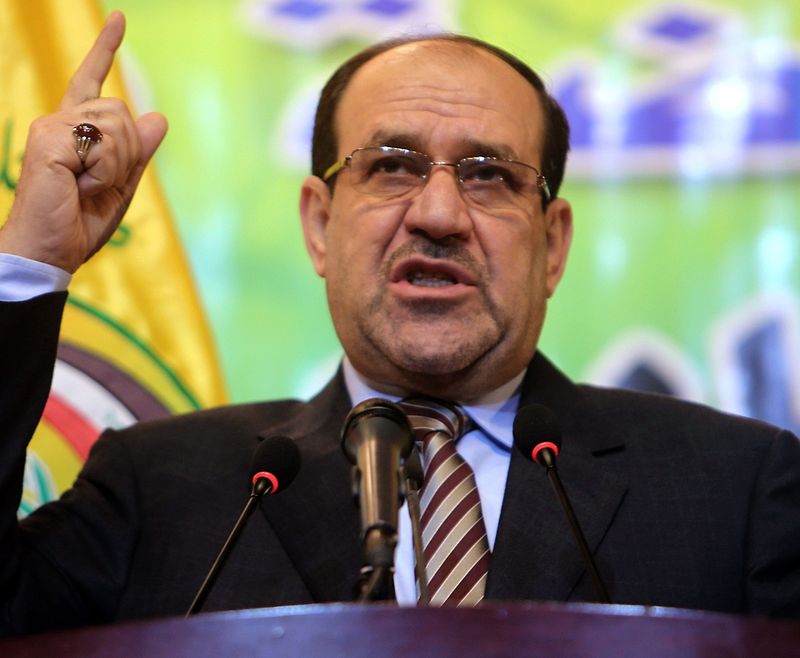
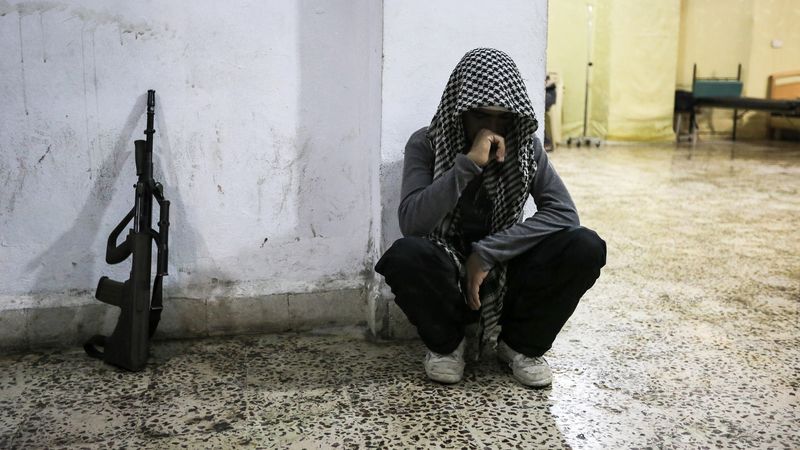



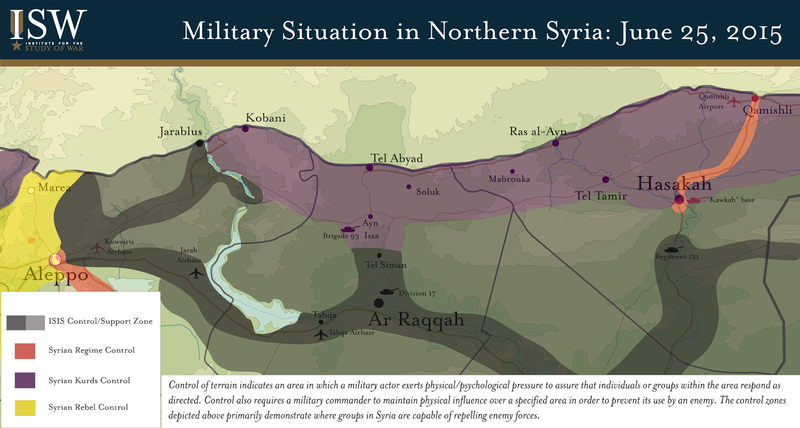
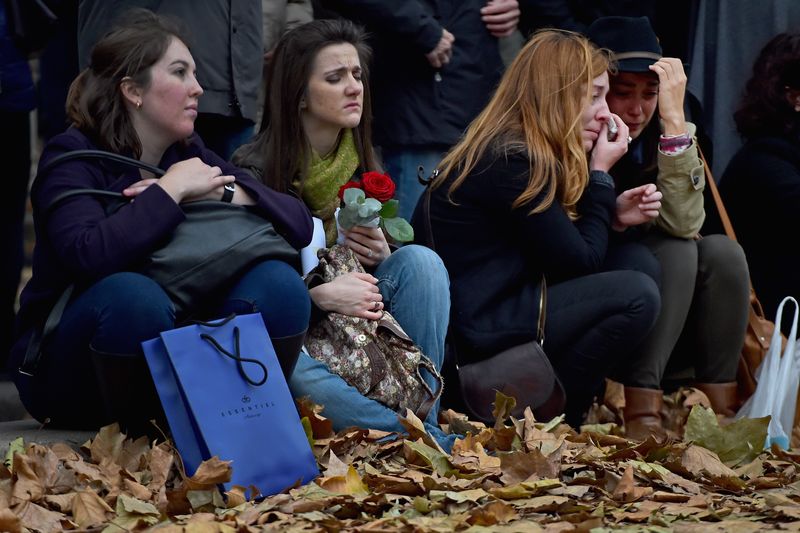
本文不开放评论